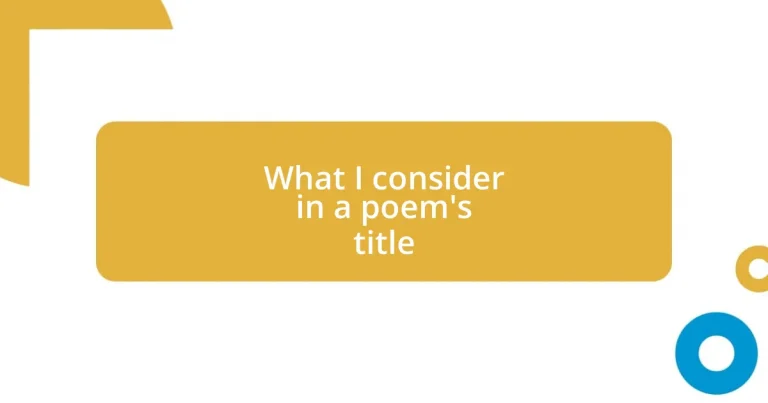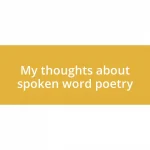Key takeaways:
- A poem’s title significantly shapes readers’ expectations and emotional engagement before they even read the poem.
- Key elements of a good title include clarity, imagery, and emotional resonance, as they evoke feelings and provoke thought.
- Crafting titles effectively may involve experimenting with word combinations, rhythm, and techniques like paradox to enhance meaning.
- Revising titles for clarity and intrigue can often lead to deeper emotional connections and insights through feedback and collaboration.

Importance of a poem’s title
A poem’s title holds incredible weight; it’s often the first impression readers have, and it can spark their curiosity instantly. I remember the time I stumbled upon a poem titled “The Quiet Hour.” That title alone made me pause, eager to delve deeper—was it a moment of reflection or a space filled with tension? Titles invite us to step into a world the poet has carefully crafted, shaping our expectations even before we read a single line.
The right title can evoke a surge of emotion or intrigue, pulling the reader into the poem’s thematic essence. For instance, when I encountered Maya Angelou’s “Still I Rise,” I felt empowered just reading it. The phrase suggests resilience and defiance, establishing an emotional foundation that resonates throughout the poem. Isn’t it fascinating how a few words can encapsulate such strength?
Furthermore, a poem’s title can also serve as a focal point that enhances its meaning. I often reflect on how a title can change my understanding of the poem. For instance, if a poem depicts loss but is titled “The Celebration,” it urges a reinterpretation, adding layers to the narrative. Titles challenge us to look beyond the surface, engaging us in a conversation about the poet’s intent and the emotions they aim to convey.
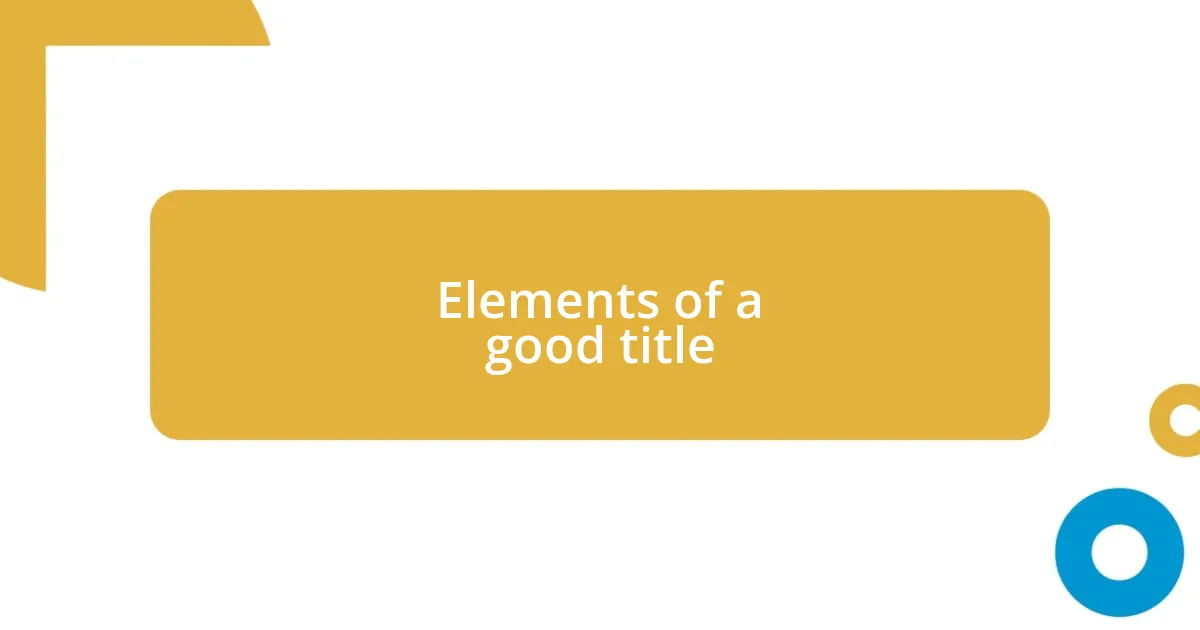
Elements of a good title
When I think about the elements of a good title, clarity always comes to mind. A title should offer a glimpse into the poem’s essence without being overly cryptic. For example, when I first saw “The Road Not Taken” by Robert Frost, it was straightforward yet layered. It beckoned me to ponder decisions and choices instantly, setting the stage perfectly for what was to come.
I’ve also come to appreciate the power of imagery in a title. Vivid words can create a mental picture that draws readers in, making them feel an immediate connection to the poem. Take “The Dance of the Fireflies,” for instance. Just envisioning those flickering lights in the darkness evokes a sense of wonder and nostalgia, coaxing readers to immerse themselves in the beauty of fleeting moments.
Another crucial element is emotional resonance. A good title should evoke feelings, whether it’s joy, sorrow, or curiosity. When I encountered “Lament for the Forgotten,” it tugged at my heartstrings. I felt compelled to explore the layers of grief and memory in the poem, realizing that the title encapsulated a broader human experience of loss. Isn’t it remarkable how just a few carefully chosen words can stir such emotions and provoke thought?
| Element | Description |
|---|---|
| Clarity | Offers clear insight into the poem’s essence. |
| Imagery | Uses vivid words to create mental pictures and evoke feelings. |
| Emotional Resonance | Evokes strong feelings that encourage connection and reflection. |
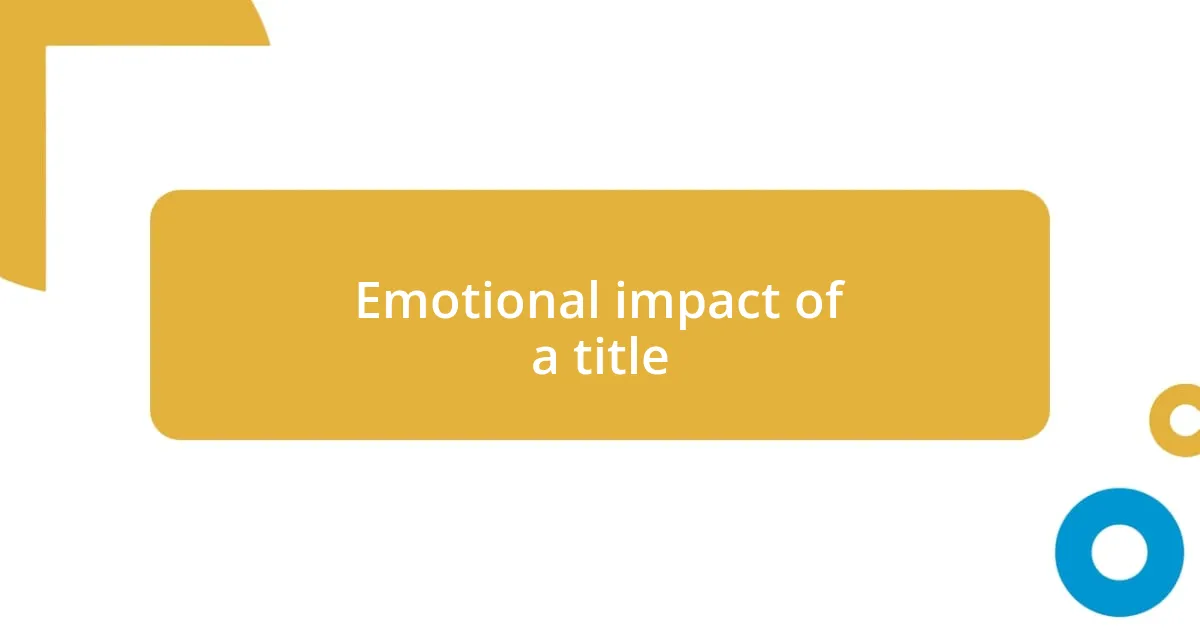
Emotional impact of a title
The emotional impact of a title can be profound, often setting the tone before the poem even unfolds. I can’t help but recall when I first saw the title “Do Not Go Gentle into That Good Night” by Dylan Thomas. Just the words “do not go gentle” stirred something deep within me, igniting a fight against resignation. It’s incredible how titles can resonate, allowing us to contemplate complex emotions like struggle and defiance, which permeate the poem.
Consider how certain titles can resonate with personal experiences, enhancing their emotional weight. For instance, when I came across “The Broken Clock,” it struck a chord with my own feelings of time lost in moments of grief. The simplicity of that title brought forth a visual that felt relevant to anyone who has felt time slip away amidst sorrow. Here are a few factors that highlight the emotional impact of a title:
- Memorable Phrases: A title that sticks in your mind can create anticipation and emotional alignment.
- Symbolism: Titles that suggest deeper meanings can evoke curiosity and encourage personal reflection.
- Personal Connections: Titles that resonate with individual experiences often inspire readers to explore their emotions.
These nuances remind me how vital a title is as the emotional gateway into a poem’s world.

Techniques for crafting titles
Crafting a title is an art form in itself, and I often find that playing with word combinations can yield surprising results. For instance, I once experimented with a title like “Shadows of Silence” for a poem about lost conversations. Those simple words painted an immediate picture and hinted at the underlying themes of absence and reflection. It’s fascinating how a few well-chosen words can evoke layers of meaning and emotion, isn’t it?
I also believe in the importance of rhythm in a title. There’s something inherently musical about a title that rolls off the tongue. I remember choosing “Whispers of the Wind” for a nature-themed piece. The rhythmic quality of those three words naturally draws readers in while suggesting a serene atmosphere. Have you noticed how rhythm can elevate a title, turning it into a lyrical invitation rather than just a label?
Another technique I cherish is using paradox or juxtaposition to provoke thought. For example, I titled a poem “Bright Shadows” to convey the complexity of hope amidst despair. This unexpected pairing not only piques curiosity but also invites the reader to delve deeper into the contrasting themes. Titles like this challenge our perceptions and encourage exploration. Isn’t it thrilling how a title can serve as a gateway to a deeper understanding of our personal experiences?
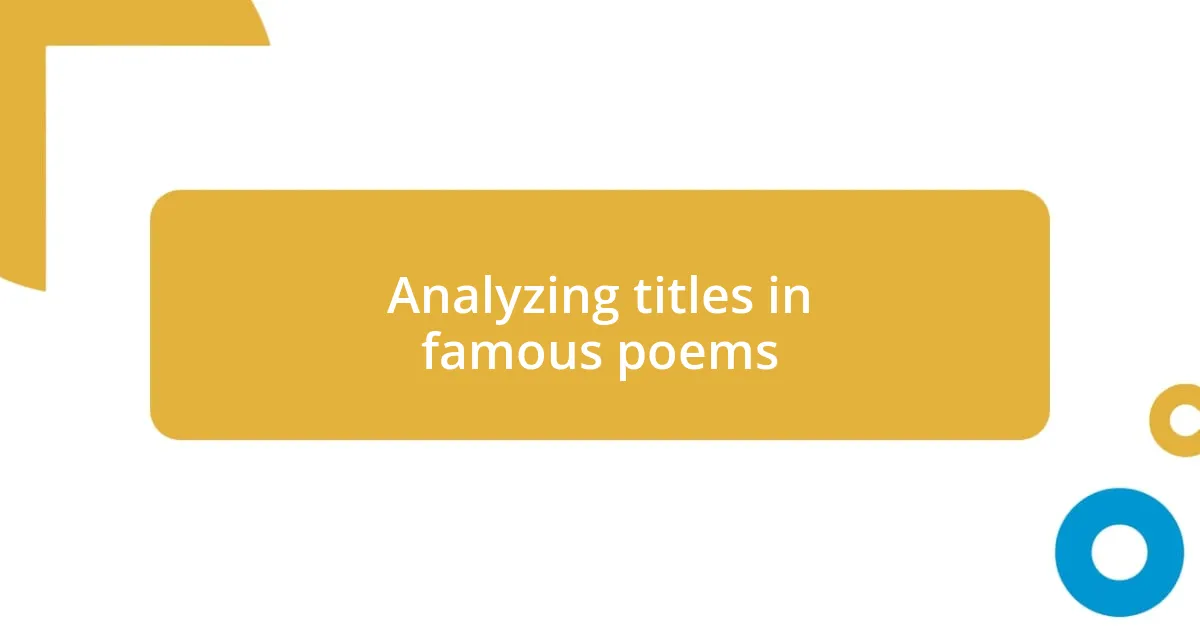
Analyzing titles in famous poems
Analyzing the titles of famous poems reveals so much about the author’s intent and emotional landscape. Take Robert Frost’s “The Road Not Taken” as an example. When I read it, the title alone made me reflect on my choices and the paths I had taken—or not taken—in life. It’s remarkable how such a title can trigger personal introspection, prompting the reader to think about the significance of their own decisions. Each word feels carefully placed, making us ponder the weight of our choices long after we’ve read the poem.
Then there’s Sylvia Plath’s “Lady Lazarus,” which immediately evokes a mix of resilience and defiance. The title suggests resurrection, and I remember feeling a surge of empowerment when I first encountered it. It conveys the essence of the poem’s exploration of rebirth amidst suffering, also acting as a feminist statement in its own right. Have you ever connected with a title that seemed to define your struggles? It’s fascinating how that single phrase can encapsulate complex narratives, drawing us into deeper considerations of identity and survival.
Finally, consider the title “The Waste Land” by T.S. Eliot. At first glance, it appears stark and simple, but it carries layers of meaning about despair and loss. I can recall the chill it sent down my spine, as I recognized that it spoke to collective disillusionment after World War I. Such titles have a unique power; they can linger in the mind, insisting we reckon with the themes they herald. Don’t you find it intriguing how these titles can act as invitations to explore the profound depths of human emotion and experience?
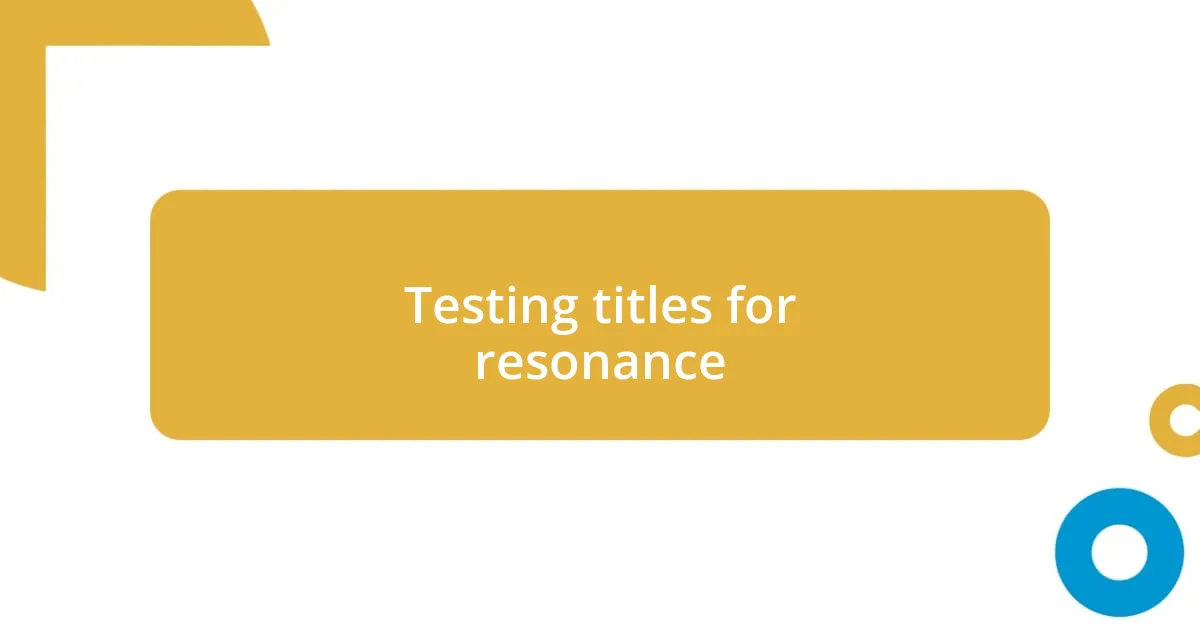
Testing titles for resonance
When I test a title, I often read it aloud to gauge its resonance. There’s a moment when I can almost feel the words vibrating in the air, and I ask myself: does the title evoke the emotion I intend? I recall wrestling with the title “Echoes of Yesterday” for a nostalgic piece. Saying it out loud, I sensed a gentle pull, as if it was inviting readers to join me in a reflective journey. That realization was a pivotal moment for me; it showed how sound and feeling are deeply intertwined in title selection.
Another method I find effective is to step back and observe how a title feels within the context of different poems. After some deliberation, I settled on “Fleeting Moments” for a piece exploring quicksilver emotions. When juxtaposed with other titles I considered, it stood out for its simplicity and depth. It struck me that, while some titles may be more elaborate, sometimes it’s the straightforward ones that resonate most powerfully. Have you ever felt a simple title capture your attention like a spark?
Lastly, I often jot down my emotional reactions to various titles in a notebook. For example, when brainstorming for a poem on grief, I wrote down “Fragments of You.” The title instantly packed an emotional punch, hinting at loss yet suggesting a sense of preservation. I found myself reflecting on how even the smallest fragments of memories can feel so incredibly significant. Isn’t it amazing how a title can ignite such vivid recollections and feelings, opening the door to a deeper exploration of our experiences?
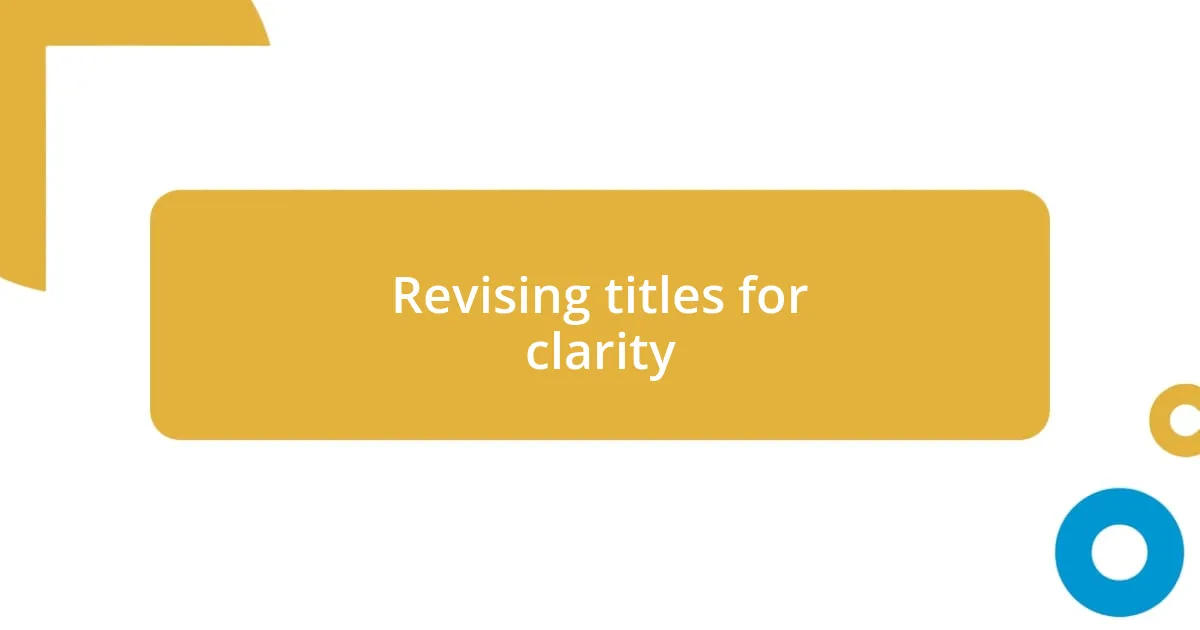
Revising titles for clarity
Revising a title for clarity often begins with a simple question: does it convey the essence of the poem? I remember reworking a title multiple times for a piece about love lost. Originally titled “The Empty Spaces,” it fell flat, failing to capture the depth of emotion I wanted to express. After a few revisions, I settled on “Echoes of Our Silence,” which not only felt clearer but also resonated with the lingering absence that was central to the poem. Isn’t it fascinating how a slight tweak can shift the entire emotional landscape?
Clarity is critical, but I believe the title should also hold an element of intrigue. When I was crafting a title for a poem about fleeting moments of joy, I found myself stuck on “Happy Times.” It felt too straightforward and predictable. Instead, I went with “In the Whisper of Laughter,” which invites curiosity while still hinting at the joy I intended to capture. Have you ever felt that tension between being direct and keeping some mystery? It’s empowering to realize that clear titles can still be evocative.
Additionally, I often find it helpful to seek feedback on titles from friends or fellow writers. A while ago, I was working on a poem about resilience in tough times. I initially called it “Strength in Struggle,” but it felt a bit generic. When a friend suggested “Roots in the Storm,” it clicked for me and sparked an emotional response I hadn’t anticipated. I could see vividly how the imagery of roots holding steady during rough weather encapsulated the core of my piece. It’s remarkable how collaboration can illuminate clarity while making our titles resonate more deeply. Have you tried bouncing ideas around with others? It’s a valuable part of the revision process that shouldn’t be overlooked.












